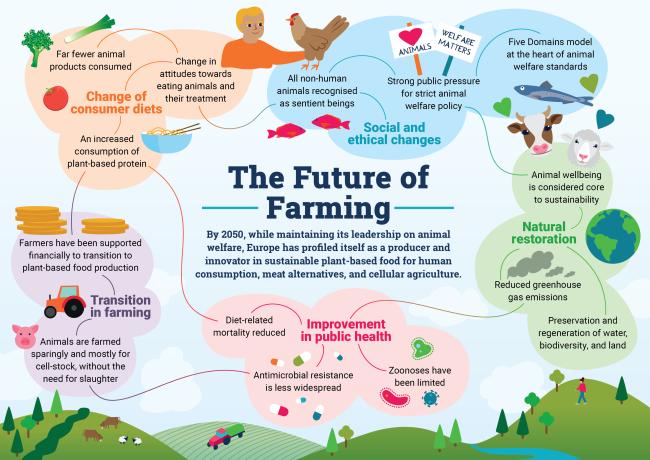
The future of farming: what our food and farming systems should look like by 2050 for the wellbeing of animals, people and the planet
In our latest Position Paper, we explain how we’d like the food and farming sectors to have evolved by 2050 in the EU, with a focus on animal welfare, plant-based products and the end of industrial agriculture.
The face of food and farming desperately needs to change in Europe (and the wider world, for that matter). Such wide-scale change is critical for the planet, as intensive agriculture systems and the mass farming of livestock contributes to emissions and ecological decline. It’s vital for people, as unsustainable farming practices threaten public health and food security. And it’s key for the welfare of animals, who suffer by the millions in industrial farming systems from abuse, neglect and the suppression of their natural behaviours and needs.
But how should the food and farming industries change, exactly? How can they be improved specifically for the benefit of people, animals, and the planet? We know these are questions that policymakers have been asking, particularly while developing laws like the Sustainable Food Systems Framework and preparing to revise the animal welfare legislation later this year. That’s why we at Eurogroup for Animals have created a blueprint for what farming should look like by 2050, that we hope can act as a touchstone for key decision-makers while shaping the EU’s food and farming industries for the future:
The future of farming: a healthier world where all sentient beings are treated with care
Some of the key elements of the future of farming, in our view, include:
- An increased consumption of plant-based protein and significantly reduced consumption of animal products (by 2030 alone, we aim to reduce animal-based production and consumption by 70%);
- A very limited number of animals raised for food production and mainly for the production of cell-stock (for innovations like cultivated meat);
- Reduced greenhouse gas emissions from the food and farming industries, alongside the preservation of water, biodiversity, and land;
- Improved public health as the emergence of zoonoses and the development of antimicrobial resistant pathogens has been limited, and diet-related mortality reduced;
- Increased awareness and knowledge about animal sentience, which has led to progress in the values that surround the treatment of all animals and is reflected in public attitudes towards eating animals.
A future where people are healthier, animals are happier, and our food and farming systems engage with nature and the climate in a sustainable way. It’s what we all deserve.
Learn more by downloading our position paper.

